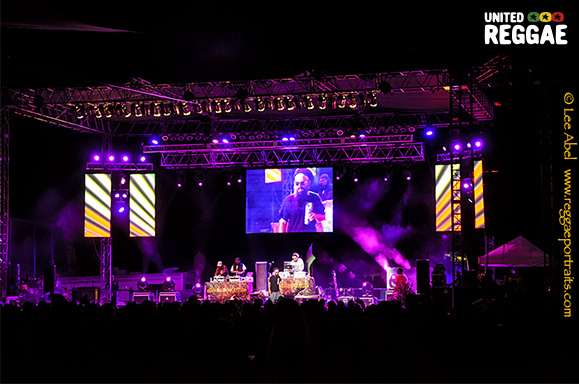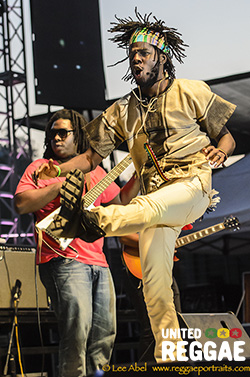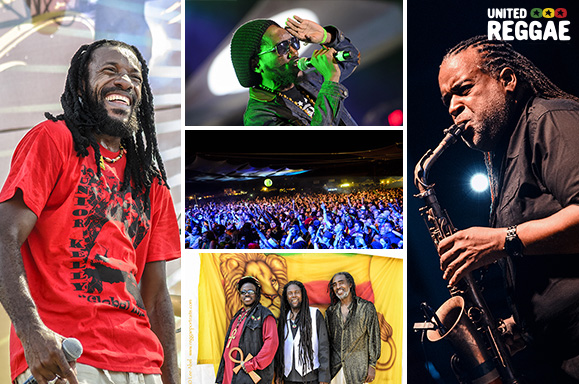Articles about reggae music, reviews, interviews, reports and more...
Reggae On The River 2013: A Triumphant Return

Reggae On The River 2013: A Triumphant Return
This year marked the 29th anniversary celebration of North America’s premier reggae festival.

Reggae On The River is hosted by the Mateel Community Center, a vibrant nonprofit cultural center deep in the Redwoods of Northern California. For nearly three decades, ‘Reggae,’ as the festival is always called, has brought in the lion’s share of the world’s most famous artists. Legends and upcoming musicians have shared the stage for three decades. Many people call it The Cornerstone of the Emerald Triangle.
In 1983, the original Mateel building was burned by arsonists, and to raise money for rebuilding, the founders created Reggae On The River. Thirty years later, the Mateel is still called “The House That Reggae Built.”
Through the course of controversy, the festival experienced changes in venue and in production. This year, with humble strength and a lot of hard work, the Mateel finally brought Reggae On The River back to its homeland. The conscious roots gathering took place August 1st - 4th and the general feeling was a celebration of the long overdue welcome home.
The Venue at French’s Camp
As the warm California sunshine began heating up the river banks, the cares and worries of the outside world were shed like extra clothing. Temporary camp villages sprang up. Homegrown herbs were passed between friends old and new, and an attitude of gratitude filled the air. A welcome addition to this year’s festival was the presence of so many children; second and third generation festival kids running around with flowers and ribbons tied in their hair.
Exploring the festival grounds, we were greeted at every turn with smiling faces proclaiming “Happy Reggae!” a namesake as old as Reggae On The River itself. People were arriving for their 10th, 20th, even 29th year – having missed only 2007 when the festival was canceled entirely. Accompanying a rasta, whose trade entails monitoring the careers of legends and tracking up-and-coming artists, offered some elevated vibes - an experience that later led to impromptu conversations with President Brown, greeting Leroy “Horsemouth” Wallace as he arrived for his performance with Rockamoyva, and a few special late-night photo ops with Anthony B.
At a time when music festivals are taking heat for the huge amounts of waste they produce, Reggae organizers strived to leave as small a footprint as possible. The greening of the festival was clear. Compost bins and extensive recycling options were stationed at every bend in the road and tin cans labeled ‘cigarette butts’ dotted the concert bowl.
The Music
Thursday night was dedicated to the local DJs and MCs of Humboldt County and the Pacific Northwest. Homegrown artists like Ras Indio, Ishi Dube, and Joseph Israel started the venue grooving before guest features from some of the weekend’s brightest stars: Nkulee Dube, Kabaka Pyramid, Army, and MC Zulu.
With San Francisco’s Jah Warrior Shelter sound system hosting the evening, local MCs felt honored to make their mark on this momentous occasion. Between beat boxing, Stevie Culture told the press: “I am feeling really blessed to be here. This event is world-wide recognized!” Also on the mic was Seattle native Bobby Hustle and Blessed Coast DJ Triple Crown who took us through a selection of songs off his 2013 release, Sweet Reggae Music. Progressive Bay Area hip hop singer Wisdom reminded the crowd to keep positive.
Kabaka Pyramid made his first appearance in California just three days earlier. He sang big tunes “No Capitalist” and “Get You” before “Feel Di Vibes” on Steel Pulse’s “Blues Dance Raid” riddim.
Panamanian-born, Chicago-based MC Zulu headlined Thursday night’s singer showcase. With San Francisco native Kush Arora on the decks. Zulu laid down a dancehall-dub mix unlike anything we had heard previously. His “electro-reggae” pushes dancehall to the outer limits, bringing in soca, cumbia, and reggaeton rhythms. Grinding out tunes like “Festival Madness” and “Big Timer,” Zulu’s baritone vocals were banging on the now classic riddim “Coolie Dance”.
Friday’s opening ceremony began at high noon. Members of California’s Pomo Indian tribe invited us to share in setting the tone for a weekend filled with gratitude, peace and unity. Their native prayers were a call to environmental consciousness and reverence for the land we were temporarily calling home.
Unlike most other music festivals, Reggae On The River stays true to its roots with the single-stage experience. Having all the artists share one stage inspires unity from within the audience – a feeling absent when rushing between stages to catch multiple acts. Between sets, the crowd could relax and take in the sounds from the region’s top selectors.
Army delivered a cool militant performance, rendering tracks off Dreadlocks Time and Rasta Awake. Flowing and on point, he brought his discernible St. Croix sound to a receptive roots crowd.
The enormously talented Nkulee Dube, daughter of African Reggae King Lucky Dube, gave an impressive performance. Her set was highly anticipated by Reggae veterans since Lucky Dube was a favored performer over the years. The moment was made even more poignant as Lucky’s birthday was the following day. After six nominations at the 31st IRAWMA awards in February, Nkulee’s noble musical linage proved indisputable as she delivered beautiful renditions of “Ding Ding Licky Licky Bong,” “Feel Irie” and originals “Who Dem” and “Back to the Roots.”
 Chronixx celebrated his debut performance in California with massive originals like “Smile For Me Jamaica” and “Here Comes Trouble.” The rasta youth is a shining example of the roots revival movement. His wildly energetic stage performance on “Ain’t No Giving In” and “Start A Fyah” were a true testament to the cycling forward of roots consciousness into this present time.
Chronixx celebrated his debut performance in California with massive originals like “Smile For Me Jamaica” and “Here Comes Trouble.” The rasta youth is a shining example of the roots revival movement. His wildly energetic stage performance on “Ain’t No Giving In” and “Start A Fyah” were a true testament to the cycling forward of roots consciousness into this present time.
In the ever-changing landscape of reggae music, one of the day’s most popular artists was Compton, California’s J Boog. The now Hawaii-based vocalist had the crowds singing every word off his breakthrough album Back Yard Boogie (2011), including lovers rock anthems “Let’s Do It Again,” “Every Little Thing” and a cover of Alton Ellis’ classic tune, “I’m Still In Love With You Girl.”
Distinctly more militant in his delivery, Tarrus Riley took the stage after a 15 minute opener showcasing legendary reggae sax player, Dean Fraser. What a pleasure to see Fraser nearly steal the show with his massive melodic interludes. Backed by the Black Soil Band, Riley opened with “Good Girl Gone Bad” planted atop the rhythms of Robin Thick’s newest jam “Blurred Lines.” Anytime an artist quotes pop-culture, a certain sector of the audience goes wild. And the excited screams of young girls confirmed that. Riley delivered a lot of new tunes as well as favorites like “Start A New” and “Love’s Contagious.”
Saturday exemplified a strong presence of tradition and culture. Between the myriad styles of dress in the crowd, to the international origins of the 30+ artists who performed, the weekend was a real-time cultural exposition.
Blue King Brown front woman Natalie Pa’apa’a is one of the rising stars of female-driving reggae. An Australian rude girl with a passion for social justice, she led her band through a well-received inaugural Reggae appearance. During their finale, band members gathered to fly the sovereign flag of West Papua for a photo with the crowd. Pa’apa’a exposed the blatant colonial oppression: “Just raising this flag [in West Papau] can land you 15 years in jail.”
Clear across the planet, Parisian princesses Les Nubians have been blessing the world with their infusion of African and Caribbean rhythms for nearly two decades. When asked their opinion on the global trend for genre mixups, they told the press:
It is a reality. What we were talking about 15 years ago is becoming reality. . . And it will happen more, more artists in collaboration and fusions. People are aware of the power, the spiciest and the beauty of their heritage. We live in a beautiful age, the Aquarius age, which is pushing us to look forward. . . I am very happy we can be a pioneer of this – this futuristic and important reality.
Anthony B took the stage with an entourage of vibes keepers. Under waving flags of red, gold, and green, the fire blazing vocalist directed his band with a commanding nyabinghi staff. Massive tunes like “Time To Have Fun” and “High Grade” had the audience captivated in unified dance. Vital in his signature Kingstep, he laid out a magnificent tribute to American legend Ray Charles.
Headlining Saturday night was Julian Marley. Dressed in full denim, Timberlands, and dreads flowing through the air, the Marley son sang more classics than I can list. His father’s anthem “Waiting In Vain” and “Babylon Cookie Jar” by Lee “Scratch” Perry complimented his own works like “Lion In The Morning” and “Systems”. It was a transcendent performance.
When asked in the press tent how reggae can further change the world, Julian replied:
By keeping to the core of what the music represents. Me hear my father say ‘reggae in Spanish means King’s music’. . . I have still heard other man, great ones, say, ‘reggae is King’s music.’ So when you talking about King’s music, it must be the highest quality of lyrical intelligence. We are taught about upliftment, and that is what King’s music is about. I think the world needs King’s music, everyone needs upliftment. When we are uplifted we feel good. We get together and there is joy. That is the real party!
As we entered into the fourth day, my companion reflected, “Everyone is resplendent in their most regal finery.” People pull out their finest garments on Sundays. After three days of festivities, they strolled the concert bowl with a little more ease in their steps. Floating on the collective energy, we were all a little smoother in our swagger. Soaring temperatures gave someone in the production crew the brilliant idea to send a water truck to the front of the stage. Joyful people covered in dust danced beneath the huge sprays of water. At that moment, it seemed the revelry could have been anywhere in the world.
Holding up that collective energy were Prestige and Junior Kelly, who connected intimately with the crowd. At one point, Prestige jumped into the middle of the crowd and knelt to his knees to sing a prayer during “My Pride.” Junior Kelly came up onto the side-stage balconies, serenading a gleaming audience. They acted as true ambassadors of the people.
One of the more unusual experiences as press is watching the bands from a distance. We took in the music of Rootz Underground from the top of the bowl sipping organic watermelon juice. With the backdrop view of the bending river and towering Redwoods, the mix converged perfectly, blowing us away with the power of the sound and the message.

The “Sunday Service,” as one media person labeled it, was the highlight of this year’s Reggae. Culminating a day of performances by some of the hottest newcomers on the scene, the long awaited return of Morgan Heritage brought the roots back to North America’s oldest reggae festival. The Royal Family of Reggae performed a few classics like “Don’t Haffi Dread,” but the core of their set rested on songs off their first new album in five years, Here Come the Kings (2013). The music was true upliftment, and the toasting was purely educational. Peetah Morgan recounted reggae music’s creation in the ghettos, saluting Toots and the Maytals with a high-energy cover of “Bam Bam.” He hollered over the cheering audience: “[Toots] is the creator, the originator, never been a duplicator!”
New tunes like the socially conscious “Ends Nah Meet” and the dignified title track “Here Come the Kings” felt like hearing the band for the first time. Adding into the mix were the promising vocals of Jemere Morgan, who lit up the stage with his new singles “International Love” and “Neighborhood Girl.” Finally, African hip hop singer, Lord Alajiman, sang to the band’s rockaz-style reggae in the Senegalese language of Woloff.
After Morgan Heritage exited the stage, the people of the Mateel Community Center gathered for a gracious salute to their festival family. Legendary festival host Doug Green, who guided us lovingly through the weekend as he has done for decades, blessed us all with his uplifting cite: “Be kind to each other.”
Surrounded by family in the press tent, Gramps Morgan took the opportunity to reflect upon returning to Reggae On The River.
It has been five years since we’ve performed here. I’ll tell you it’s a joy, you know. We miss this festival. It is one of the premier festivals in North America. There are many festivals that have been around and Reggae On The River is still here, and we are happy to see that. It shows the longevity and the perseverance of reggae music. Much respect and love to the ones that started this festival and brought it to where it is today.
It was a fitting ending to a perfectly kindred weekend.
Read more about this topic
Read comments (1)
| Posted by Kato Kenneth on 11.17.2013 | |
| Gone are the days when they said "reggae music is prohibited in Europe & America" today, i like the way europe and america accepts the culture of reggae. its a tool for fighting racism, prejudice, segregation, hate! | |
Comments actually desactivated due to too much spams
Browse by categories
Recommended Articles
Latest articles
Recently addedView all
© 2007-2026 United Reggae. All Rights Reserved. Reproduction in whole or in part is prohibited. Read about copyright
Terms of use | About us | Contact us | Authors | Newsletter | A-Z







































































